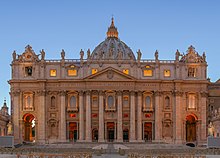
Back تاريخ الكنيسة الكاثوليكية Arabic Istor an Iliz katolik Breton Història de l'Església Catòlica Catalan Geschichte der römisch-katholischen Kirche German Ιστορία της Καθολικής Εκκλησίας Greek Historia de la Iglesia católica Spanish تاریخ کلیسای کاتولیک Persian Katolisen kirkon historia Finnish Histoire de l'Église catholique French Historia del Ecclesia Catholic Interlingua
| Part of a series on the |
| Catholic Church |
|---|
 |
| Overview |
|
|
The history of the Catholic Church is the formation, events, and historical development of the Catholic Church through time.
The tradition of the Catholic Church claims it began with Jesus Christ and his teachings; the Catholic tradition considers that the Church is a continuation of the early Christian community established by the Disciples of Jesus. The Church considers its bishops to be the successors to Jesus's apostles and the Church's leader, the Bishop of Rome (also known as the Pope), to be the sole successor to St Peter[1] who ministered in Rome in the first century AD after his appointment by Jesus as head of the Church.[2][3] By the end of the 2nd century, bishops began congregating in regional synods to resolve doctrinal and administrative issues.[4] Historian Eamon Duffy claims that by the 3rd century, the church at Rome might even function as a court of appeal on doctrinal issues.[5]
Christianity spread throughout the early Roman Empire, with persecutions due to conflicts with the polytheist state religion. In 313, the persecutions were lessened by the Edict of Milan with the legalization of Christianity by the Emperor Constantine I. In 380, under Emperor Theodosius, Christianity became the state religion of the Roman Empire by the Edict of Thessalonica, a decree of the Emperor which would persist until the fall of the Western Roman Empire, and later, with the Byzantine (Eastern Roman) Empire, until the Fall of Constantinople. During this time, the period of the Seven Ecumenical Councils, there were considered five primary sees (jurisdictions within the Catholic Church) according to Eusebius: Rome, Constantinople, Antioch, Jerusalem, and Alexandria, known as the Pentarchy.
The battles of Toulouse preserved the Christian West against the Umayyad Caliphate of Sunni Islam, even though Rome itself was ravaged in 850, and Constantinople besieged. In the 11th century, already strained relations between the primarily Greek Church in the East, and the Latin Church in the West, developed into the East-West Schism, partially due to conflicts over papal supremacy. The Fourth Crusade, and the sacking of Constantinople by renegade crusaders proved the final breach. Prior to and during the 16th century, the Church engaged in a process of reform and renewal. Reform during the 16th century is known as the Counter-Reformation.[6] In subsequent centuries, Catholicism spread widely across the world despite experiencing a reduction in its hold on European populations due to the growth of Protestantism and also because of religious skepticism during and after the Enlightenment. The Second Vatican Council in the 1960s introduced the most significant changes to Catholic practices since the Council of Trent four centuries before.
- ^ Catechism of the Catholic Church (2nd ed.). Libreria Editrice Vaticana. 2019. Paragraph 862.
- ^ Hitchcock, Geography of Religion (2004), p. 281, quote: "Some (Christian communities) had been evangelized by Peter, the disciple Jesus designated as the founder of His church. Once the position was institutionalized, historians looked back and recognized Peter as the first pope of the Christian church in Rome"
- ^ Norman, The Roman Catholic Church an Illustrated History (2007), pp. 11, 14, quote: "The Church was founded by Jesus Himself in His earthly lifetime.", "The apostolate was established in Rome, the world's capital when the church was inaugurated; it was there that the universality of the Christian teaching most obviously took its central directive–it was the bishops of Rome who very early on began to receive requests for adjudication on disputed points from other bishops."
- ^ Chadwick, Henry, p. 37.
- ^ Duffy, p. 18.; "By the beginning of the third century the church at Rome was an acknowledged point of reference for Christians throughout the Mediterranean world, and might even function as a court of appeal."
- ^ Cite error: The named reference
Norman81was invoked but never defined (see the help page).
© MMXXIII Rich X Search. We shall prevail. All rights reserved. Rich X Search